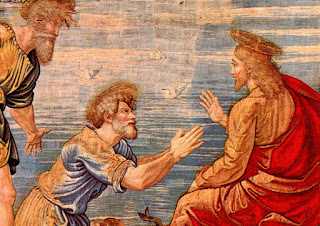Belief and Action
TWENTY-FOURTH SUNDAY IN ORDINARY TIME (B)
click here for readings
Is Christianity a system of belief, or a call to action? What if I told you it was both?
There have been many false prophets through the ages who have erred by over-emphasizing one side of this question over the other. In our day many believe that simply being good is good enough. Being a “good person” is seen as the paragon of virtue and the sure key to sainthood, regardless of whether one has faith in Christ or anything else.
On the other hand you have those following the traditions of 16th century Protestant reformer Martin Luther who taught salvation by “faith alone.” The idea is that we can never merit heaven by our own actions. Only faith in Christ makes salvation possible, therefore faith in Christ is all you need.
Both of these views contain elements of truth, but neither is sufficient. They each lack some truth contained in the other.
The Catholic Church, following the Bible, teaches that both faith and works are necessary for our salvation. We see this teaching expressed clearly in today’s second reading. “What good is it, brothers and sisters, if someone says he has faith but does not have works? Can that faith save him? … faith of itself, if it does not have works, is dead” (Jas 2:14-18).
There is a clear difference between believing and putting that belief into practice. I might believe that investing in a certain stock can make me a millionaire. But if I don’t actually invest my money, my belief gains me nothing. I can know that studying before an exam will help me to get a better grade, but that does me no good if I don’t bother to actually study.
Faith in Christ is like that. You can believe that Jesus is the Son of God, but then what do you do about it? Does that belief make any difference in your life?
In today’s gospel reading (Mk 8:27-35), Jesus asks the disciples a very important question: “Who do you say that I am?” Peter gives the right answer. “You are the Christ.” Peter believes correctly. But what Peter does next shows that he has failed to put that belief into action.
Jesus says something difficult to hear, which Peter cannot accept. He speaks about how He would suffer, be rejected by all the elders, be killed and then rise from the dead. This was too much for Peter and so he rebuked the One in whom he had just professed his faith. Jesus’ response was, “Get behind me, Satan!” If we profess faith in Christ but choose to reject any of His teachings that we find difficult, then Jesus may as well be talking to us.
And let’s be honest. If we don’t find any of Jesus’ words difficult or challenging, we are not really paying attention. Immediately after rebuking Peter, Jesus tells us to deny ourselves and take up our cross. The impact of this statement is lessened because you and I have never witnessed a crucifixion. But imagine what that phrase must have meant to the first-century hearers of Jesus. Crucifixions were a regular, gruesome sight in first-century Palestine. There has been no greater instrument of torture and execution devised by man than the cross. Those condemned to die by this horrible method were often forced to carry the instrument of their own demise while crowds jeered and harassed them. Every one of Jesus’ hearers would have seen this and been familiar with the agony it involved. This is what Jesus told them to emulate.
That certainly qualifies as a “hard saying” of Jesus. So how do we put our faith into action when it comes to denying ourselves and taking up our crosses? Denying yourself is compared to the cross because it means giving up that thing which is most precious to you — your self. When James speaks in his epistle of giving food to the hungry or giving a cloak to the naked, he’s telling us to give up our own comforts for the sake of others. Loving your neighbor means making sacrifices.
Now here’s the kicker. Christ doesn’t stop at telling us to love our neighbors. He tells us to love our enemies. In last Thursday’s gospel reading (Lk 6:27-38) Christ said, “Even sinners love those who love them.” Christ demands more from us. He expects us to love even those who are indifferent to us or who hate us.
Love, like faith, requires action. Just as it is not enough to say, “I believe in Christ” and not follow up that belief with action, so it is not enough to simply have loving feelings towards someone and not put that love into action. Love costs us something of ourselves — it requires us to deny ourselves. That’s hard enough to do for someone we actually like; imagine how difficult it is to actively love someone who hates you. This is the love Christ calls us to.
Denying yourself, loving those who hate you — this all seems like backwards nonsense to the world. But as Christ tells Peter, “You are thinking not as God does, but as human beings do.” Jesus knows that only by denying yourself can you learn what it truly means to love; and that the more perfectly we learn to love, the closer we come to holiness and to God, our origin and our end.
To love in this way requires faith and action, working together. Word and deed. This is what it means to live as a Christian. This is what it means to “work out our salvation” (as St. Paul puts it; Phil 2:12). This is what it means to become a saint.


